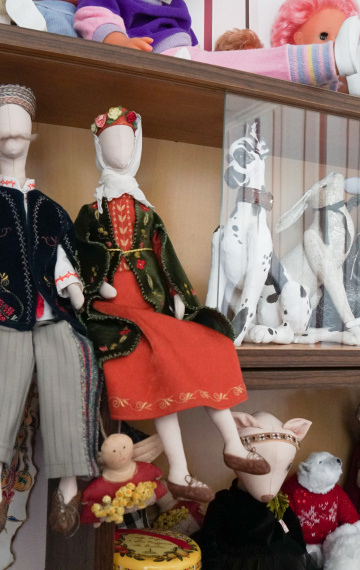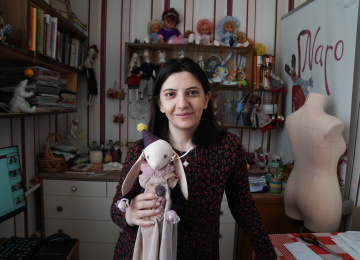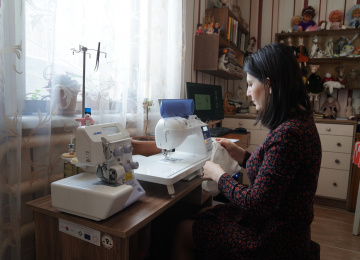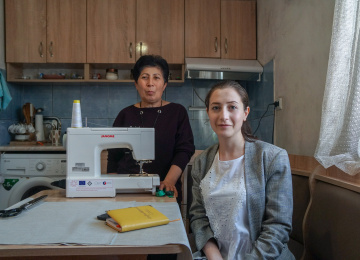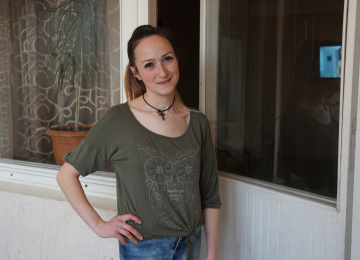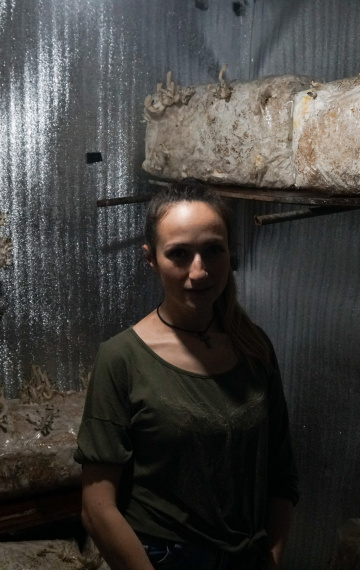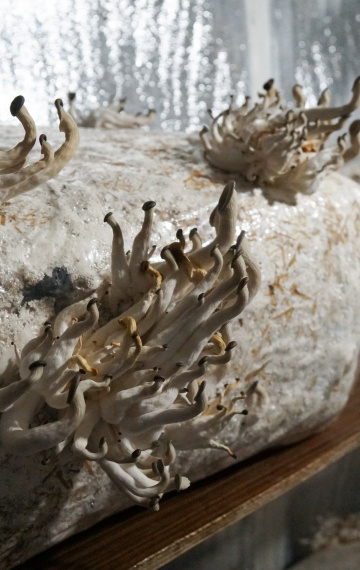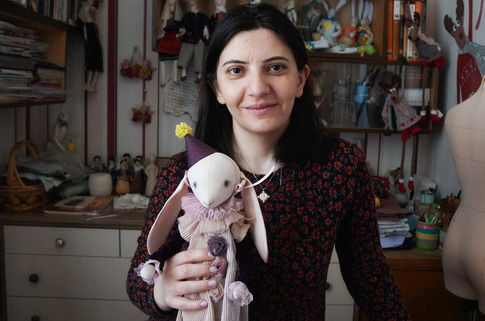
Three womenfrom the Armenian city of Gyumri, are now able to grow their businesses thanks to the EU-funded COVID-19 Solidarity Programme for the Eastern Partnership under the EU4Business umbrella. Through this project, People in Need (PIN) also supports civil society organizations all around the country.
Narine Minsyan studied economics and worked in a bank until deciding to change careers and live her dream. Her company is called Narodolls: “I went to sewing classes and I started making the dolls. Since childhood I really liked them, and I decided to create them myself. I really loved reading fairy tales, and decided to recreate some of the characters. At the beginning, I was only making animals, but later it slowly changed to Armenian themed dolls. I hope tourists will be interested!”
She runs her company from a traditional old house where she lives with her mother. In the small entrance hall, she has her work room with a sewing machine. The equipment was donated by Women’s Rights House (WRH), alongside several training and opportunities for business consulting. WRH is one of several Armenian civil society organizations that PIN chose to support within its EU4Business project. Initially, 30 women from the Shirak region were invited to compete for funding, and Narine was one of the lucky 13 women who were selected to receive a small grant to start their own business. During the process, mentors supported her in designing her startup with the goal of creating a sustainable enterprise: “I participated in two month-long workshops that gave me many new skills and knowledge, how to promote the product. Last year was difficult due to Covid, so it helped me a lot,” says Narine.
COVID-19 Solidarity Programme for the Eastern Partnership is not only about individual aid. It focuses on civil society organizations that are trained, capacitated and financially supported to be more prepared for coping with pandemic situations. “Within the project in Armenia we supported 17 Civil Society Organisations (CSOs) in different ways so far. CSOs received a series of trainings to enhance their implementing as well as reporting skills. They also obtained financial support for their Covid-19 mitigating activities. Last but not least, due to a challenging recent pandemic and political development in the country, representatives from 12 project CSOs used a change to benefit from offered psycho-social support,“ says Dorota Šuráňová, PIN coordinator of the Programme.
Lena Hovhannisyan, from Gyumri, Armenia, had a good business idea. What she needed was a big break. Ever since university, Lena wanted to start her own business making eco-friendly bags. But it wasn’t until the Covid-19 pandemic that her idea became reality.
Support from the Covid-19 Solidarity Programme for the Eastern Partnership project under EU4Business made it possible.
Last year, an Armenian civil society organisation, the EU-supported Women's Rights House held an open call for project proposals to support female entrepreneurs in the country’s Shirak region. Lena applied for and won a grant. “As part of the project we have purchased two sewing machines and materials,” Lena says proudly.
Together with her mother, Lena produces and sells textile shopping bags, which help reduce plastic waste in the environment and pad her family’s finances. Every bag sold includes a brochure explaining why it is important to stop using polyethylene bags. For Lena, her new green business is a dream come true.
“Now, we will concentrate on marketing,” she says with a smile. “It will not only be targeted at selling the bags, but also will target the Shirak region to promote environmental activism.”
Zina Manukyan, from the Armenian city of Gyumri, has a business plan. She wants to grow and sell a variety of Oyster mushrooms. Now, thanks to the EU-funded COVID-19 Solidarity Programme for the Eastern Partnership, idea is becoming a reality.
Zina Manukyan, 27, lives with her mother, and together, they take care of Zina’s two small sons, aged one and three. With such young children at home, it is difficult for Zina to find a job. When the Covid-19 pandemic started, it became almost impossible.
Initially, 28 women were invited to compete for seed funding, and Zina was one of the lucky 13 women who was selected to receive a small grant to start her own business. During the process, mentors supported Zina in designing her startup, with the goal of creating a sustainable enterprise. “At first I wanted to grow vegetables, but I changed my mind later,” she says. “My business is mushroom growing. We have ready blocks that I ordered from Ejmiatsin town. The mushroom grows on the wood,” she explains. The Oyster mushroom “incubator” is in the cellar of her flat, in an old Soviet-style block house. Now the mushrooms are really small and she is experimenting with humidity and temperature. When she learns how to grow them effectively, she will start selling them.
“It is very healthy,” Zina says “In Gyumri I don’t see this mushroom in the market often, but there is a big demand; especially younger people really like it.”.
Before having kids, Zina worked as a hairdresser, sewing and doing nails on the side to make extra money. But when her kids were born, she didn't have time for work. “In the beginning I was thinking about developing a business around hairdressing, but then I changed my mind to mushrooms,” she says proudly.
So far, she doesn’t have a name for her new company, but as the mushrooms grow, she’s thinking about it.

